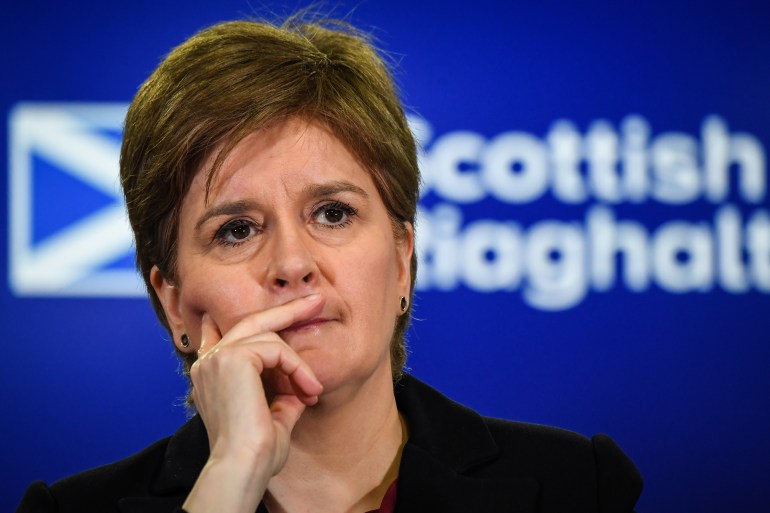Scotland’s First Minister Nicola Sturgeon resigns | News
DEVELOPING STORYDEVELOPING STORY,
Sturgeon became the leader of the ruling Scottish National Party in the wake of its 2014 independence referendum.
Scotland’s First Minister Nicola Sturgeon resigned after eight years in the job.
Sturgeon became the leader of the ruling Scottish National Party (SNP) in the wake of its 2014 independence referendum when the country voted 55 percent to remain as part of the United Kingdom.
“This decision comes from a deeper and longer-term assessment. I know it might seem sudden, but I have been wrestling with it, albeit with oscillating levels of intensity, for some weeks,” said Sturgeon during a press conference announcing her resignation on Wednesday.
“Essentially, I’ve been trying to answer two questions. Is carrying on right for me? And, more importantly, is me carrying on right for the country, for my party and for the independence cause I have devoted my life to?
“I understand why some will automatically answer ‘yes’ to that second question, but, in truth, I have been having to work harder in recent times to convince myself that the answer to either of them, when examined deeply, is yes and I’ve reached the conclusion that it’s not,” she said.
Sturgeon will remain in her position until her successor is elected as Scotland’s First Minister and will remain a Member of the Scottish Parliament (MSP).
Under her tenure, Sturgeon led her party to a resounding success at the 2015 UK election, winning 56 of 59 seats in Scotland and establishing it as Britain’s third-largest party, before she retained control over the devolved parliament at more recent elections.
She was also a scathing critic of UK’s departure from the European Union – a move opposed by a majority of voters in Scotland – and said she wants a new referendum to be held before the end of 2023.

Gender recognition bill
Sturgeon had recently become embroiled in a row over transgender policies after Scotland passed a Gender Recognition Reform Bill, making it easier for people to change their legal gender.
But British Prime Minister Rishi Sunak’s government blocked the bill because it could impact the law in the rest of the United Kingdom.
Sturgeon’s SNP also suffered a blow in November when the United Kingdom’s top court ruled that her Scottish government could not hold a second referendum without approval from the British parliament.
Successive Conservative governments in London have said the 2014 referendum was a once-in-a-generation decision and could not be repeated so soon.
Sturgeon said in response that she would turn the next British general election into a de facto referendum to ramp up pressure on London to grant another vote.

Pingback: Plus d'informations
Pingback: have a peek here
Pingback: แผ่นติดหลังคา
Pingback: https://stealthex.io
Pingback: Diyala Science
Pingback: Vox kasyno